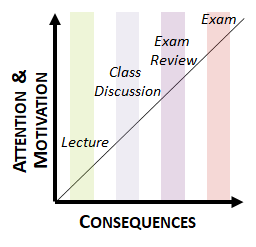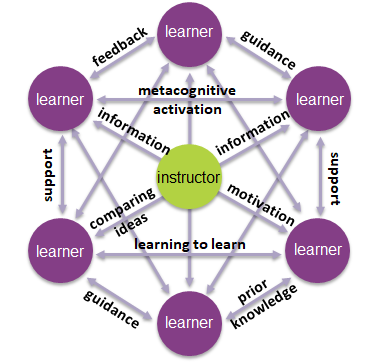What are Two-Stage Exams?
Two-stage exams (also called tiered exams, pyramid exams, group quizzes, collaborative testing, cooperative exams, and team-based tests) allow students to work in groups or teams as a second step in the exam process that leverages assessment in order to promote and enhance learning and content retention.
To ensure individual preparation and accountability, students most often receive separate grades for their individual tests and the team test. This motivates them to not only do well for themselves, but also bring the best information they can to their team discussions.
What’s the Evidence for Learning and Retention?
Two-stage exams and other collaborative testing models have been tested for immediate learning (individual responses to the same questions three days after the exam; Gilley & Clarkston, 2014), retention at one month (individual scores on repeat questions on the subsequent exam; Cortright et al., 2003; Vogler & Robinson, 2016), and retention two months later (individual scores on repeat questions on the final exam; Vogler & Robinson, 2016; Knerim et al., 2015; Zipp, 2007), with most studies showing positive outcomes at all stages.
Why do Two Stage Exams Work?
 For learning to occur, a variety of critical conditions must be met. Traditional exams provide the ideal scenario for some of these critical conditions, such as motivation, attention, and activation of prior knowledge.
For learning to occur, a variety of critical conditions must be met. Traditional exams provide the ideal scenario for some of these critical conditions, such as motivation, attention, and activation of prior knowledge.
However, they lack other necessary critical conditions: availability of new information; process for comparing ideas; feedback, guidance, and support; activation of one’s metacognition around learning and thinking; and even support for learning how to learn.

By building in a second, collaborative phase to the exam process, two-stage exams leverage the high-stakes moment for learning as well as assessment by creating a network among students.
Through discussion and collaboration, students produce many additional critical conditions for themselves and one another, resulting in a significant increase in understanding and better retention of content and concepts over time.
References
Bloom, D. (2009). Collaborative test taking: Benefits for learning and retention. College Teaching, 57(4), 216-220.
Gilley, B. H., & Clarkston, B. (2014). Collaborative testing: Evidence of learning in a controlled in-class study of undergraduate students. Journal of College Science Teaching, 43(3), 83-91.
Carpenter, S. K. (2014). Spacing and interleaving of study and practice. In V. A. Bonassi, C. E. Overson, and C. M. Hakala (Eds.), Applying Science of Learning in Education. American Psychological Association.
Knerim, K., Turner, H., & Davis, R. K. (2015). Two-stage exams improve student learning in an introductory geology course: Logistics, attendance, and grades. Journal of Geoscience Education, 63(2), 157-164.
Lerner, J. S., & Tetlock, P. E. (1999). Accounting for the effects of accountability. Psychological Bulletin, 125(2), 255-275.
Lusk, M., & Conklin, L. (2003). Collaborative testing to promote learning. The Journal of Nursing Education, 42(3), 121-124.
Macpherson, G. L., Lee, Y., & Steeples, D. (2011). Group-examination improves learning for low-achieving students. Journal of Geoscience Education, 59(1), 41-45.
Repice, M. D., Sawyer, R. K., Hogrebe, M. C., Brown, P. L., Luesse, S. B., Gealy, D. J., & Frey, R. F. (2016). Talking through the problems: A study of discourse in peer-led small groups. Chemistry Education Research and Practice. doi:10.1039/c5rp00154d
Rieger, G. W., & Heiner, C. E. (2014). Examinations that support collaborative learning: The students’ perspective. Journal of College Science Teaching, 43(4), 41-47.
Salomon, G., & Perkins, D. N. (1998). Individual and social aspects of learning. Review of Research in Education, 23, 1-24.
Toppino, T. C., & Brochin, H. A. (1989). Learning from tests: The case of true-false examinations. Journal of Educational Research, 83, 119-124.
Vogler, J., & Robinson, D. H. (2016). Team-based testing improves individual learning. The Journal of Experimental Education. doi:10.1080/00220973.2015.1134420
Wiggins, G., & McTighe, J. (1998). Understanding by Design (Expanded 2nd Ed.). Upper Saddle River, NJ: Merrill Prentice Hall.
